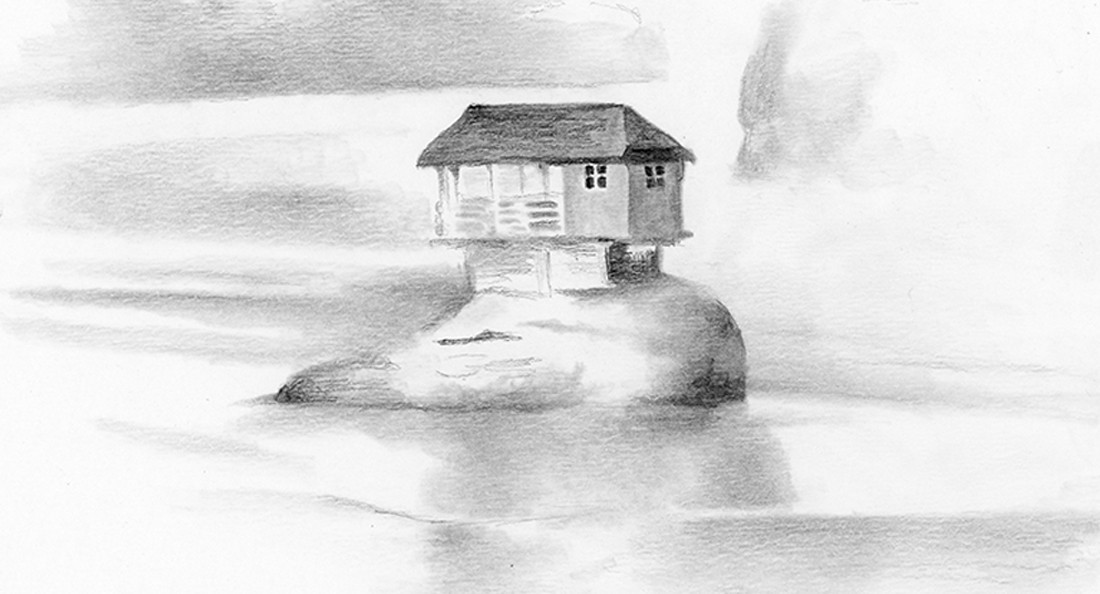Cottage class
What waterfront access says about belonging
Whenever I go out to my parents’ cabin at Bel-Air, Man., I make a point of accessing the water directly from my aunt and uncle’s cabin, which is a waterfront property a couple of doors down, by way of the staircase they’ve constructed leading down to the rocky beach.
For years, I refused out of pride, choosing instead the public path next to them, which, over time, has so eroded it now boasts a sign cautioning folks to use the path “at their own risk.”
The public path for non-waterfront properties washes away every winter and grows treacherous during transitional seasons. So, I now use my aunt’s without hesitation. Many of the surrounding neighbours are, like them, doctors or professionals whose dwellings sit unused for months anyway.
The beach is usually empty, and I make a game of hopping the rocks as far as I can manage it, evaluating the cabins that peek out from manicured lots I could never afford. I began this ritual when my parents purchased the land the summer I turned 18.
While they filled albums documenting that strip of dirt as it took shape, and the labour required in order for it to do so, my brother and I would escape to the water, pout, resent their good intentions and being implicated in them.
I still don’t see many people, but I sometimes sit on the empty adirondack chairs at the edge of these properties, imagining a life where this is my routine. A cup of coffee, a worn paperback, this view.
I’ve been escaping into other worlds, on the page (or in my head), since I was a small child who yammered in gibberish that I imagined was English, fantasizing about growing up with my cousins in Canada. I didn’t yet realize that life looked very different for different people in Canada, and it was cottage culture, in particular, that threw these disparities into sharp relief.
As new immigrants, my parents worked three jobs apiece and attended night school, cobbling together enough money for a downpayment. During that time, in elementary school, I somehow befriended the daughter of a prominent Winnipeg family. For a short time, I experienced the perks of this proximity to privilege, culminating in a trip to her family cottage(s) at Victoria Beach.
I no longer remember the specific details of what we did that weekend, what we ate or even what the cabin looked like, though I imagine it now intentionally sparse in that Pinterest sort of way, with white-washed wood. What remains was how I felt around these elegant Targaryen-blonde people – that stab of longing and envy I experienced, not for the last time, when I rubbed up against the limitations of my position and experience.
These were polite people with soft voices. Everything was provided: all of the things I forgot or didn’t know to pack, having never been a guest at a cabin before. I likely came home raving about how wonderful it was, which I suspect might have influenced my parents’ decision to rent cabins nearly every summer until they could afford their own.
My next visit to Victoria Beach came in middle school, again at the invitation of another friend to her grandfather’s cabin. This place was decidedly more rustic, finished in wood, housing a collection of antique farming implements. Upstairs, there was a large bedroom with bunk-beds built directly into the wall, for all of the grandchildren to sleep, in Von Trapp family fashion.
Over lunch, my friend, in some misguided attempt to forge a connection told her grandfather, a German immigrant, that I, too, was an immigrant, from the former Yugoslavia. At that, he glanced up at me, eating soup, and said: I can tell. She eats like one of them.
After that, I was only offered the cheap tea.
That moment marked a widening: It was the beginning of a lifelong project of unearthing that difference, and response to difference, has many nuances. It wasn’t even enough for this man that I was white, or European too – I wasn’t the the right kind of immigrant, or class of person. I didn’t eat soup the right way.
Victoria Beach’s history of ethnic exclusivity is well documented. In 1943, an editorial ran in the Victoria Beach Herald that implored residents to protect the community from “unwanted people” after a Jewish family was barred from purchasing a cottage there.
As late as 1981 and 1982, the Victoria Beach electoral and tax roll revealed the ethnic breakdown of cottage owners at Victoria Beach was still comprised of at least 70.2 per cent Anglo-Saxon ownership, 8.8 per cent Slavic and 6.8 per cent French.
What, I think, I responded to about the Victoria Beach of my youth was this sudden, but fleeting, proximity to an easy belonging that eluded me, as a displaced person, and continues to elude many, many, others. It was standing on the rocky beach peering up at the waterfront cabins, wondering how it would feel to belong there: to be inside.
But, when the price tag for belonging (or assimilation, as the case may be) is $295,000, as the Financial Post reported was the median price for waterfront properties along Lake Winnipeg, who gets to belong? And, more broadly, what are the implications of a largely British enclave claiming private property on stolen land.
Dunja Kovacevic is the comments editor of the Uniter and co-founder of the feminist anthology, Dear Journal.
Published in Volume 72, Number 24 of The Uniter (April 5, 2018)







